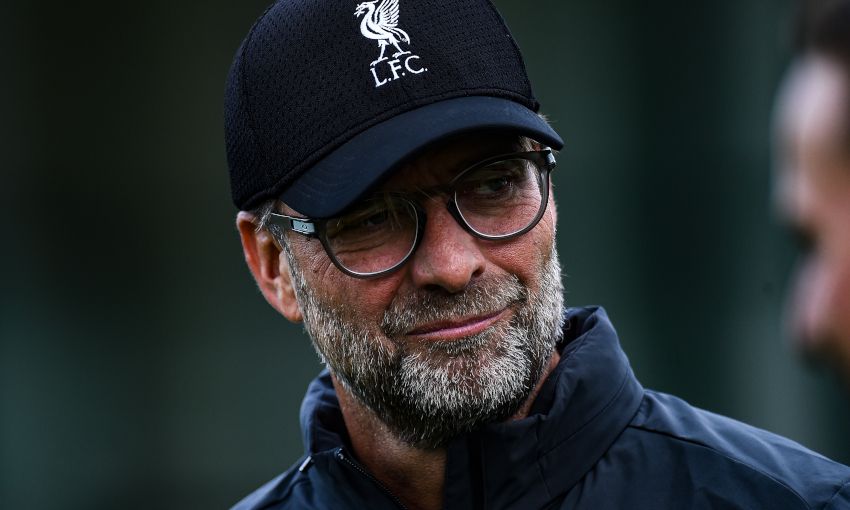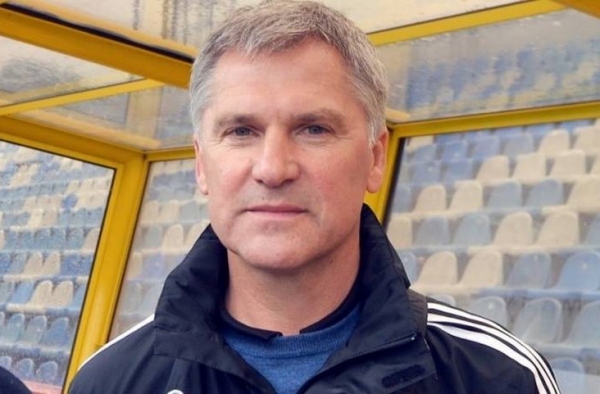Exclusive interview to the BDFL Journal (German Football Coaches Association)
Jürgen Klopp (52) is the builder of the current UEFA Champions League winner – Liverpool FC. In the age of stylish football, characterized by tactical subtlety, Klopp also shines with his rhetoric and his rousing address to the team. He has the gift of always finding the right words and a great charisma. Even as a player, “Kloppo” was a smart strategist who dealt a lot with systems and tactics.
The success coach of Liverpool FC is characterized by great natural authority and he has a brilliant hand in the management of his teams, be it in Mainz, Dortmund or now in Liverpool. By winning the Champions League in Madrid this year (2-0 win over Tottenham Hotspur), Klopp reached the peak of his successful coaching career and was named World Coach of the Year by FIFA in September. He moved to Liverpool in autumn 2015 after ending his collaboration with Borussia Dortmund in the crisis-ridden pre-season at his own request. Klopp found an atmosphere similar to that in the Ruhr area on Anfield Road. He has built a powerful team there over the past four years. Characterized by his offensive tactics, carried by the passionate as well as atmospheric backdrop of the Anfiel Road. But “Kloppo” doesn’t just know the sunny side of the football business. In 2007 he was relegated from the 1st league with the 1. FSV Mainz 05, and the emotional football teacher also had to digest some final defeats with Borussia Dortmund and FC Liverpool. At Borussia Dortmund, the likeable coach found ideal terrain after his time in Mainz to refine his ideas of a heart-warming, offensive football. Klopp and BVB – that fit. From 2008 to 2015 he led the traditional club again to titles (two German champions and one DFB cup winner).
In 2004, Klopp completed the Football Teacher training course at the sports university in Cologne under the then DFB chief trainer Erich Rutemöller and has since then also been active for the Association of German Football Teachers, including as a co-initiator of the BDFL Bundesliga coaching conferences. At the end of October, the BDFL press chief, Marcus Dippel, spoke to the communicative football teacher about his career as a coach in Mainz, Dortmund and Liverpool, the role of coaches in today’s professional football and what was fascinating for him in the coaching profession.
Marcus Dippel (MD): First of all, congratulations from the BDFL, dear Jürgen. You were named FIFA World Cup coach on September 23. How does it feel for you to be the third German coach after Jupp Heynckes and Joachim Löw to be awarded this honor?
Jürgen Klopp (JK): I was very happy to accept the honor and was happy, but it didn’t feel special to me. I have never taken myself so seriously in my career that I felt that I had to be distinguished for anything. Overall, it was a very pleasant evening for me, which was crowned by the fact that I was allowed to sit next to Fabio Capello the whole time. I am aware that you can only receive such an award if your team has played an outstanding season. In this respect, this personal award is an appreciation of the work of everyone involved at Liverpool FC, especially for my players.
MD: You have been working for Liverpool FC since October 2015. How does your job as head coach and team manager in the Premier League generally differ from your previous two coaching positions in the Bundesliga in Mainz and Dortmund?
JK: The biggest difference is that in large English clubs there is only one voice outside, namely that of the manager. For me, this means that only my voice appears in public and I am asked practically all matters relating to Liverpool FC. In England there is no equivalent to officials like Harald Strutz and Christian Heidel in Mainz or Michael Zorc and Hans-Joachim Watzke in Dortmund. The second big difference is that football culture in England is completely different. The football office with the sports director, the numerous scouts, the analysts and all other employees of the club is centered around the training area. In Germany, the situation only develops in such a way that everything comes together at a central point. Since I am the boss of everyone, I have to take care of all other things in addition to the training work with my team. It is a relatively large amount of power that you have to deal with wisely. I find it important that I don’t get bogged down in all of these areas. At Liverpool FC, I currently have normal working days of up to ten hours, sometimes with a game in the evening (I’m happy).
In Liverpool, the manager is even more important due to the great coaching personalities of the past like Bill Shankly. Before you criticize the coach or manager at Liverpool FC, you’d rather swap the whole team.
MD: What attracted you to take on the challenge in Liverpool in autumn 2015?
JK: I can’t explain it exactly. Liverpool, like everyone else in football, was of course a household name. I was particularly drawn to the club’s emotionality. I am thrilled that football plays such an outstanding role in this city. There was also the fact that the club was in an average situation at the time, which is not entirely irrelevant for the start as a trainer or manager. The basis was given at Liverpool FC to make a change. I had a good feeling from the first conversation with my boss Mike Gordon and felt the right connection to him as guys and people. In my coaching career I was twice lucky enough to meet club leaders like Harald Strutz and Christian Heidel in Mainz and Michael Zorc and Hans-Joachim Watzke in Dortmund. It’s like this: You can be the best coach in the world as a coach, but if you are in the wrong club at the wrong moment, you simply don’t have a chance! I did not have this feeling in Liverpool in the beginning, but the opposite was the case, so it was clear to me relatively quickly that I was going to take on this big challenge.
MD: What fascinates you in general about the coaching profession?
JK: For me personally, the coaching profession is simply the best thing that could have happened to me. The job as a coach made it possible for me to extend my time in professional football considerably. I have been enthusiastic about good footballers since childhood, and now I can work as a coach with outstanding footballers. For me personally, this is really something really big, especially due to the fact that my career as an active football professional was more of a boring average (laughs).
As a coach, I have a lot more influence on the game today than in the past as a player. I think it’s great that things that I have in mind can be put into practice by my players because of their excellent skills on the pitch. Training work with my team is for me THE highlight of my previously described working day of up to ten hours. It fascinates me that I can help my players with their hints to exploit their great potential.
MD: To what extent has the coaching profession changed in the past 18 years of your coaching work?
JK: The football game has changed during this period, and with it the coaching profession inevitably. The game has gotten a lot faster these days because players are better trained. The things I did 18 years ago in Mainz still have to be done today, but the biggest difference is that I no longer have to do them all myself. When I became a coach in Mainz in 2001, Stephan Kuhnert looked after the goalkeepers, otherwise I did the training work alone and together with Christian Heidel took care of the scouting. It was a great and educational time for me, but it is simply no longer feasible today. At Liverpool FC we currently have five Assistant coach, five athletic trainers and four analysts. This staffing of the trainer team with experts inevitably increases the quality. In the past, there was no objective measurement data such as the mileage. Back then, the idea was that you have to train so that you were completely “in the bucket”. Regenerative possibilities, load control etc. were not even considered in the beginning.
MD: I would like to talk about the beginnings of your coaching career. With 1. FSV Mainz 05 you made the direct jump from player to head coach. How did this certainly unusual situation come about in February 2001?
JK: We lost 1: 3 at the weekend in Fürth. I was rightly replaced by coach Eckhard Krautzun because I hadn’t played very well. The coach then called a crisis meeting, which ended in a press conference the day after that he wanted to announce that he would no longer play with the older players. Christian Heidel noticed this. He decided not to fire the older players but to dismiss the coach.
He asked me if I could do the coaching job. I agreed, and it was immediately clear to me that I would no longer play myself. I managed three training units and on Ash Wednesday we won 1-0 against MSV Duisburg through a goal from Christof Babatz.
MD: In the 90s, as a player, you were the “extended arm” of coach Wolfgang Frank at 1. FSV Mainz 05. How did this football teacher shape you as a coach?
JK: Wolfgang Frank was really an exceptional trainer! He made us aware that a football team is much more independent of the individual class of individual players than we thought at the time. We have seen through him that it can make life very difficult for the opponent through a better common idea. Based on this feeling, we tried to win duels in the right rooms and thus not to let the opponent develop. We suddenly played much better under him. Back then it was like an enlightenment for us. Under Wolfgang Frank, for the first time in my career, I had the feeling that a coach has a huge impact on the game. This feeling reinforced me that at some point I could really enjoy my career as a coach.
MD: What is particularly important to you in dealing with your players and your coaching team on a daily basis?
JK: To be honest, I’ve never really thought about it. I don’t have a list of things that are particularly important to me in this regard. Of course mutual respect plays an extremely important role in my work. It is very important to me that my players know that they can speak to me at any time. I want to offer my players and my employees an environment in which they feel comfortable and in which they can achieve the best possible performance. As a team of trainers, we try to create and maintain exactly such an atmosphere. My approach in life is general: when I enter the room, the mood should never get worse, ideally better (laughs). When you come to a club as a coach, there is no guarantee that things will actually go better. But you can try together to spend the best possible time together and to be successful with each other.
MD: For years you were active as a representative of the Bundesliga soccer coach on the BDFL board and a regular participant in our Bundesliga coaching conferences, in the course of which you repeatedly appeared as the spokesman for your coaching colleagues. How did you perceive these BDFL Bundesliga coach meetings?
JK: I was involved in developing the idea of the Bundesliga coaching conferences around 15 years ago and I really loved these conferences. As a professional trainer, you have almost no possibility to ask questions anywhere, because as head coach you always have to have answers ready. It is classified as weakness or uncertainty if it is not. No doctor or scientist in the world is expected to do this, but we professional trainers! The BDFL gives us professional trainers the opportunity to listen to interesting lectures and simply ask questions.
MD: To what extent do the BDFL Bundesliga coaching meetings help to develop a kind of community feeling or solidarity among you professional coaches?
JK: I enjoyed sitting with the coaching colleagues in the evening, discussing topics and just having a beer together. Inevitably, these conferences have improved the relationship among us professional trainers. We all very much appreciate that the BDFL offers us the opportunity to meet at any hotel in Germany on two dates a year and to relax and exchange ideas in a different atmosphere away from the hustle and bustle that professional football brings with it , It’s like a kind of protected space for us professional coaches! When do we ever have the opportunity to talk to someone who has the same problems? I am very sorry that I am currently unable to attend these conferences due to my work in England.
MD: Many important decisions in professional football are made without you coaches. Actually an unsustainable condition, isn’t it?
JK: Definitely, at some point we coaches in international professional football have to find a common voice. We are aware that as a coach we have a temporary appearance in a club are. The everyday problems that result from any decisions, however, are mainly felt by us coaches. A current example from Liverpool: At the moment, nobody in England has any idea when we should play our quarter-finals in the League Cup against Aston Villa because the game date collides with the Club World Cup in Qatar.
MD: Actually incredible! How do you think such a development could have happened?
JK: Professional football is booming and is a business where everyone inevitably wants to get a piece of the big cake. Nobody is ready to put back. We all have to be aware that this game only works because of the players. If we don’t start protecting players soon by reducing the number of games and the stressful situation that comes with it, football will lose quality. That’s why I said over a year ago that I don’t understand the principle of the Nations League. The international players only have games that they have to win. This is awesome! FIFA, UEFA, the respective associations and leagues must finally come to a table to correct the game plan in the future. A national player in modern football who plays in an ambitious club that is always represented in Europe has a maximum of two to three weeks off per year. We all agree that this cannot work in the long run! Regarding your initial question: I am sure that if we coaches were involved in such decision-making processes, the problems would not exist to this extent. It is now up to us to make ourselves heard in the professional football business.
MD: So far you have been head coach for seven years in both Mainz and Dortmund. Is it really possible for you to take a break from your coaching career after your time in Liverpool? How do you imagine this time exactly?
JK: First of all, it is important to me that I never talked about the end of a contract in 2022. I just said that I would take a year off if at some point I stopped being Liverpool coach. Then I just want to take the time for things that are important to me. I would very much like to spend more time with my family.
I am traveling a lot in the current situation. My biggest problem in this wonderful job is the lack of time. As long as I am young and healthy, I really want to use the time to have good times with my family.
MD: You mentioned it: Your contract in Liverpool currently runs until June 2022. What kind of development do you aim to achieve with your team and the club in the future?
JK: We have developed to a high level to this day. To be able to take the next step, we first have to maintain the level. We have to develop the team structure further by engaging new players or introducing young players to our professional team.
At the moment we have a very positive atmosphere around Liverpool FC that should be exploited. At the moment we are very good at having the best possible time with each other – as described above. For us, the first thing is to maintain this atmosphere!
MD: For these tasks, we at the BDFL wish you, Jürgen, the greatest possible success and hope to see you again at one of the next Bundesliga coaching conferences!
JK: Thanks, I hope so too!



